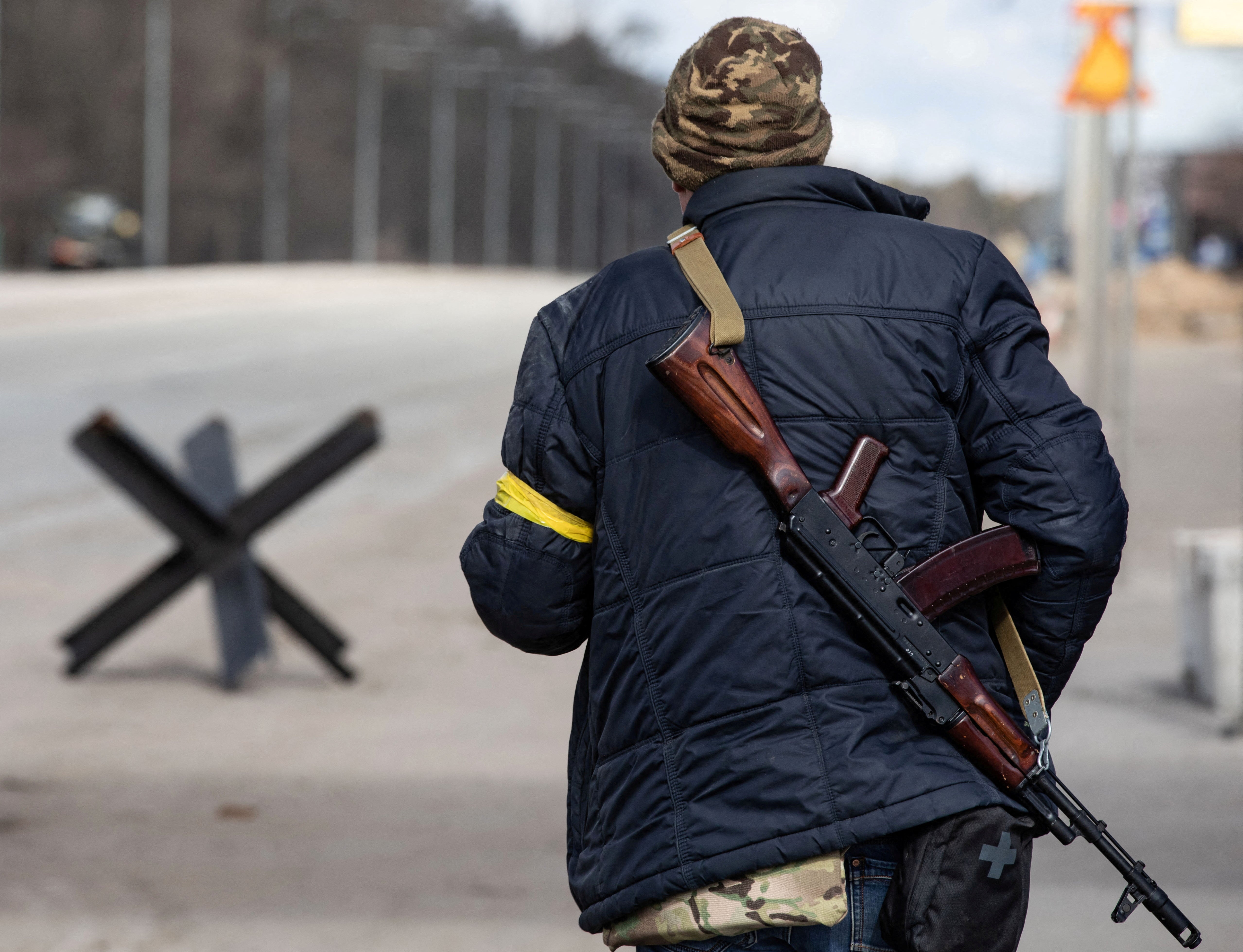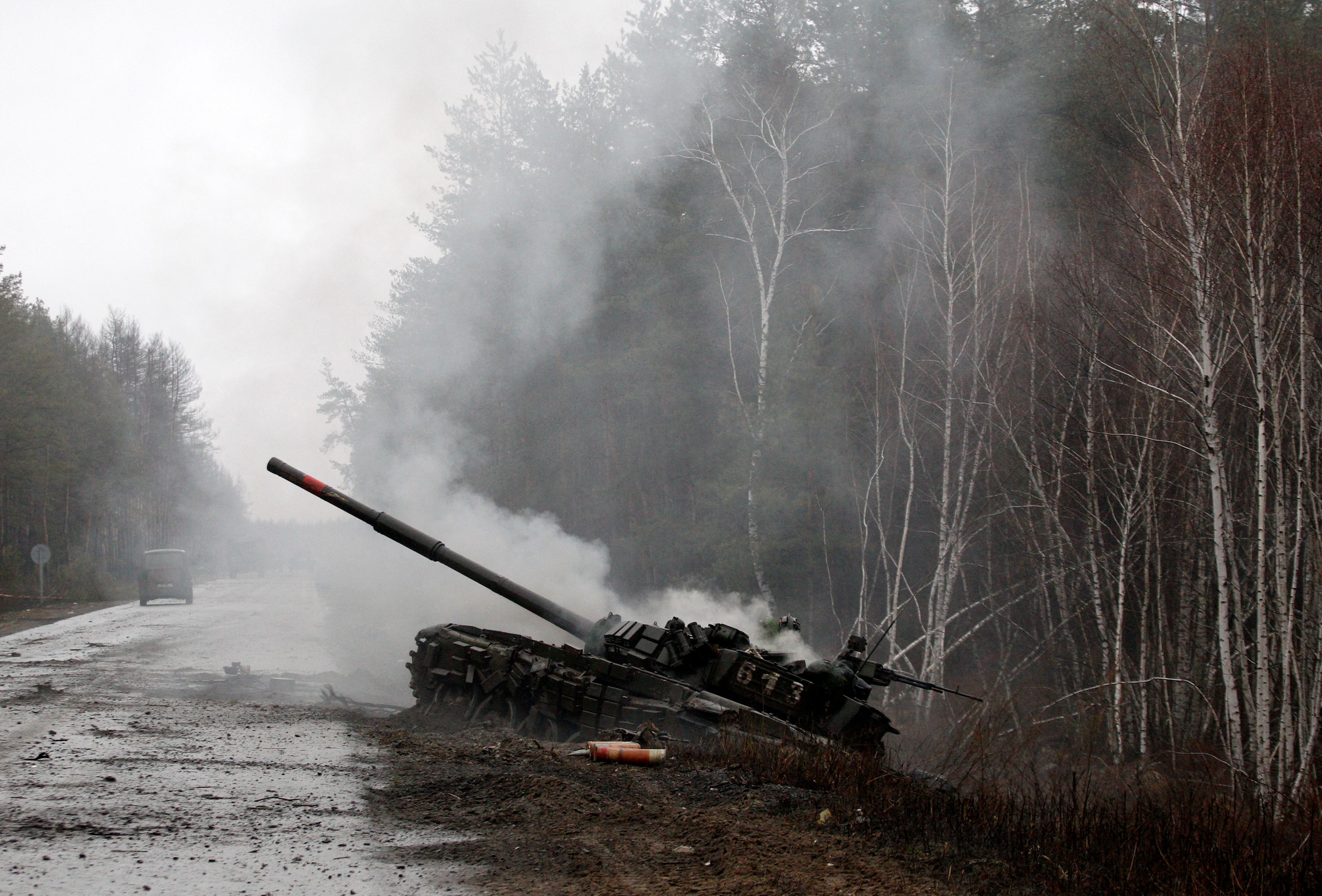
Ukrainian forces claim to have fought off an attack to seize Kharkiv after ferocious fighting in the country’s second city on Sunday, as Russia’s President Putin raised the stakes yet further by putting his nuclear forces on “high alert”.
As the war, which has sent a seismic shudder across the world entered a fourth day, street fighting in Kharkiv resulted in Ukraine’s forces managing to resist the advance of Moscow’s troops, governor Oleh Synyehubov claimed.
“Control over Kharkiv is completely ours! The armed forces, the police, and the defence forces are working, and the city is being completely cleansed of the enemy,” he wrote on Telegram. The claim could not be verified.
Earlier, it was reported that Russian forces had entered Kharkiv and attacked fuel facilities close to the city. A natural gas pipeline was blown up, said Ukraine’s state service of special communications and information protection. Videos showed a massive mushroom-shaped explosion from the attack.
Videos posted on Ukrainian media and social networks also showed Russian vehicles moving across Kharkiv and Russian troops roaming the city in small groups. One showed Ukrainian troops firing at the Russians and damaged Russian light utility vehicles abandoned nearby.
The images appeared to underscore the determined resistance Russian troops face while attempting to enter Ukraine’s bigger cities. Ukrainians have volunteered en masse to help defend the cities, taking guns distributed by authorities and preparing firebombs to fight Russian forces.
Ukraine’s government also is releasing prisoners with military experience who want to fight for the country, a prosecutor’s office official, Andriy Sinyuk, told the Hromadske TV channel Sunday. He did not specify whether the move applied to prisoners convicted of all levels of crimes.
As fierce fighting continued across Ukraine, the country’s president Volodymyr Zelensky called on Russia to be taken to the International Court of Justice in The Hague, for Moscow claiming the attack was prompted by “genocide”, a claim without substance.

This came after the country’s prime minister Denys Shmyhal accused Moscow of “war crimes”.
Russia, meanwhile, said it was ready for peace talks with Ukraine in Belarus. President Zelensky said he was ready for discussions, but rejected the offer to hold them in Minsk, calling it an invasion staging ground. Russian troops have entered Ukraine from Belarus.
In a separate development, President Putin has ordered Russian nuclear deterrent forces on alert amid tensions with the West over his invasion of Ukraine. Speaking at a meeting with his top officials, the Russian leader asserted that leading Nato powers had made “aggressive statements” along with the West imposing hard-hitting financial sanctions against Russia, including the president himself.
Mr Putin ordered the Russian defence minister and the chief of the military’s General Staff to put the nuclear deterrent forces in a “special regime of combat duty”.
The US Ambassador to the United Nations Linda Thomas-Greenfield, said that was an unacceptable escalation.
“It means that President Putin is continuing to escalate this war in a manner that is totally unacceptable and we have to continue to stem his actions in the strongest possible way,” Thomas-Greenfield said in interview with CBS “Face the Nation.”
Because of the war, German Chancellor Olaf Scholz announced his country would sharply increase its spending on defence to more than two per cent of its economic output, around £80 billion.

It is the latest in a series of major Berlin policy shifts prompted by the war. Germany this week also halted its Nord Stream 2 gas pipeline project with Russia and agreed to send weapons to Ukraine after long resisting pressure from Western allies on both issues and facing accusations of being too dovish towards the Kremlin.
The exodus to leave Ukraine continued apace on Sunday with claims that some 368,000 people have now fled abroad, the UN’s refugee agency has said, citing data provided by national authorities. It follows an estimate of at least 200,000 just hours earlier.
The capital, Kyiv, was eerily quiet after huge explosions lit up the morning sky and authorities reported blasts at one of the airports. Only an occasional car appeared on a deserted main boulevard as a strict 39-hour curfew kept people off the streets. Terrified residents instead hunkered down in homes, underground garages and subway stations in anticipation of a full-scale Russian assault.“The past night was tough - more shelling, more bombing of residential areas and civilian infrastructure,” Ukrainian President Volodymyr Zelenskyy said. “There is not a single facility in the country that the occupiers wouldn’t consider as admissible targets.”
Earlier in the day, large flames lit up the sky after missiles hit the Ukrainian town of Vasylkiv, setting an oil depot ablaze before dawn. It is situated about 40km south of the capital Kyiv.

In Kyiv, people took shelter in their homes, underground garages or subway stations as they anticipated a full-scale attack by Russian forces. Thousands of women, children and men across the city have been rushed to safety as the administration clamped a 39-hour curfew to keep people indoors.
It is unclear how much territory Moscow has seized. However, a UK minister said Russia’s invasion plan is “nowhere near running to schedule” due to fierce resistance from the Ukrainian people against the Kremlin’s advance.
According to a senior US official, Russian forces are reportedly becoming demoralised, disoriented and hungry. Russian soldiers had reportedly been overheard complaining that Ukranian resistance was much stiffer than they had anticipated.
On one radio call, the official said they heard a soldier saying: “We don’t know who to shoot – they all look like us.”
Additional reporting by agencies







